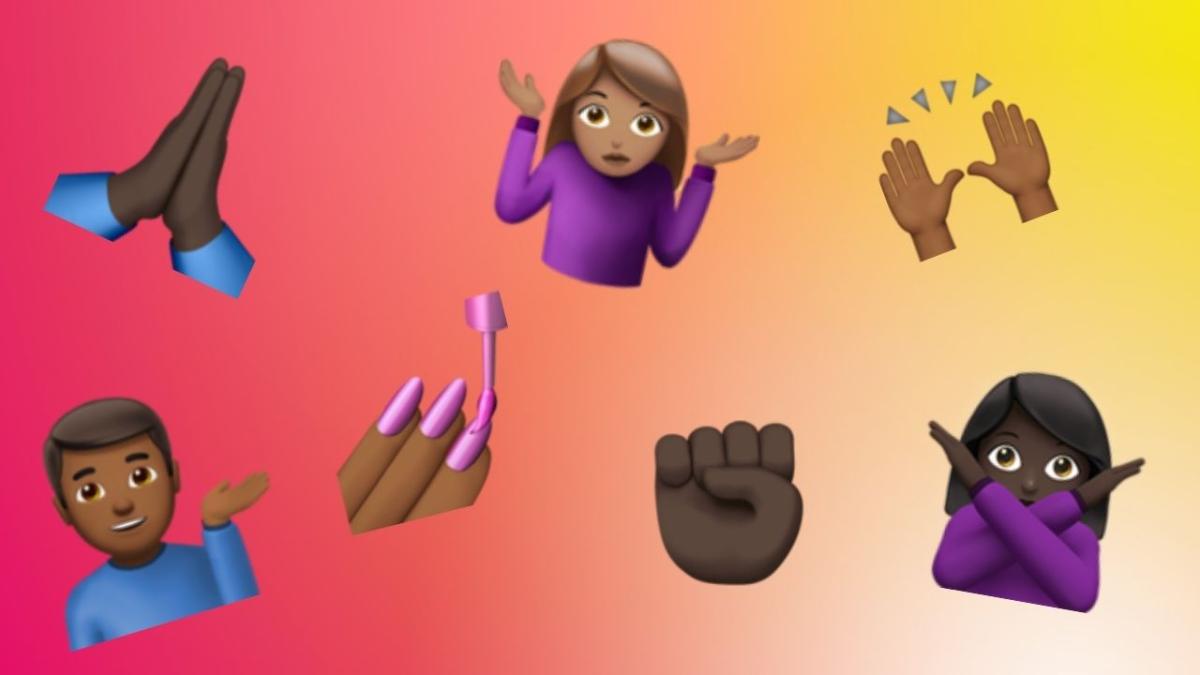
It was only a few weeks ago that I first came across a white friend using brown and Black emojis.
Their decision both perplexed me and made me uncomfortable, but I shrugged it off and gave it the benefit of the doubt. I mean, there’s bigger issues in the world, right?
But as the weeks progressed, so did the amount of white people in my online spaces using brown and Black emojis to represent themselves in conversations. It got to the point where I was starting to feel gaslit. Am *I* the one using the wrong emoji??? Is this actually just meant to represent white people’s fake tans, instead of my own brown skin?
But then other POC started talking to me about it too. I realised that a lot us feel really uncomfortable around whites who do this. Turns out, most of us have secretly hated it for years but have never had the confidence to call it out since there are “bigger problems” than just micro-aggressions.
my absolute biggest emoji pet peeve is when white people use brown emojis
take off your digital blackface smh https://t.co/UFeJCVhg74
— claire de lune (@ClaireMPLS) February 2, 2021
Well, emoji discourse might seem frivolous, but the internet is a huge part of the way we communicate and it shapes our perceptions of the world and our own behaviour. We know that nothing exists in a vacuum, and that even the smallest micro-aggression fits into a bigger culture of race and appropriation.
So, I put a call out online for white people who use emojis darker than their skin tone to explain why they did so on Instagram. I received 128 replies to the survey, and another 100 or so DMs from people who wanted to explain their answer in more depth. Here’s what they had to say.
“I have brown hair.”
This was the most common answer I received in my Instagram survey. It seems that many white women with brown/dark hair wanted their hair colour to be part of their emoji-self. So, they started to use emoji 3, which has brown hair but brown skin, too.
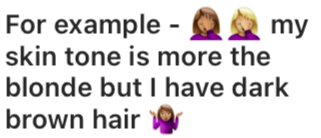
Interestingly, I use emoji 3 but for opposite reasons: while its hair is too light for me, its skin tone is closer to mine than the darker emoji. I thought it was more important to use the correct skin tone than the correct hair colour, because I felt it wasn’t right to make a claim to darker skin when that is not my life experience.
It seems that a few of the above women realised this too and ditched “brunette representation” for the sake of avoiding digital blackface.
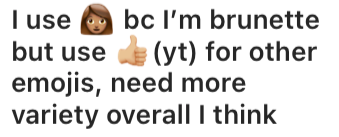
Interestingly, some argued that they couldn’t use the black haired white emoji because that represents “Asians”. But this logic didn’t extend to the brown emoji, which for some reason was not racialised like the “Asian” one. Hmmm.
“I have an olive skin tone/ I tan to this shade.”
This one fascinates me, because I think it’s a really subjective one.
Emojis don’t really denote one specific race — I mean, you can’t squash the whole world of non-white people into three emoji skin tones and not expect some creative uses.
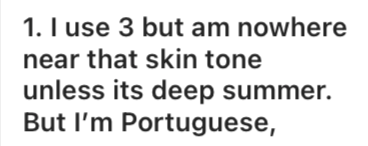
I have plenty of ethnic friends who are maybe a little lighter than me but we all use emoji 3 to denote that we are non-white yet in the grand spectrum of human skin tones, not that dark?
However, some white people argued that they can use a brown emoji too since they can just tan themselves to that colour, and that the brown tone has nothing to do with race. Sigh.
I’ve written about this previously, so if my exasperation confuses you, please read this article on the problematic nature of tanning and blackfishing.
“I use a variety of emoji tones because I think it’s realistic/ a form of solidarity.”
This was a really interesting response because I’d never heard it before, yet it was the second most common answer!
Quite a few people responded saying they switch up their emoji colours all the time because they want to challenge the idea that “white is the default”.
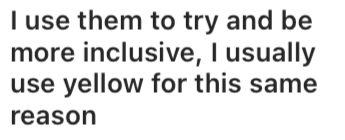
This was also a common answer from white people who manage social media pages and want the page to feel authentic and diverse.
It seems it’s a common approach from well-meaning white allies to try and create diversity in workplaces/online spaces, but I’m interested to know who told them this was something POC want.
“I’ve just never thought about it.”
I mean, this one speaks for itself.
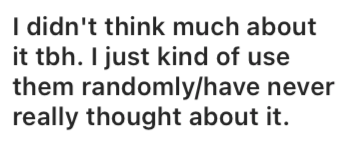
So, what do Black and brown people think of white people using their emojis?
Glad you asked! From the many Black and brown folk that replied to my surveys and questions, not a single one of them were okay with white people using dark emojis. There are a few reasons for this:
It’s not solidarity if we didn’t ask for it
While I totally appreciate the positive intent here, it’s important to note that many Black and brown people feel incredibly uncomfortable when white people use darker emojis. Whether or not you view emojis as a representation of yourself, that’s how you’ll be perceived by others — and there are implications of experience and knowledge that come with implying Blackness (for example), which don’t exist if the person using the emoji is white.
A good example is my own use of PEDESTRIAN.TV’s social media. I don’t use the brown emoji in our social media posts, even if I’m the one making them. Instead I use the “neutral” yellow emojis because a brand cannot make claims to the clout and rights that come with ethnic skin — that is reserved for ethnic people.
Basically, while diversifying feeds is a noble task, do that by actually hiring POC to make content for you. Or if it’s your own socials, share Black and brown people’s content on your page instead of masquerading as them. You may not realise it but using brown emojis makes it look like there are POC behind the screen, when there aren’t.
https://twitter.com/genderqueerwolf/status/1293689232557473792?s=20&t=cJmTGzIVnmZogUupDcVKBw
Digital blackface
This was the most common and obvious answer.
If you aren’t across it, digital blackface refers to “non-Black people making anonymous claims to a Black identity through contemporary technological mediums, such as social media,” as described by writer Laura M Jackson in 2014.
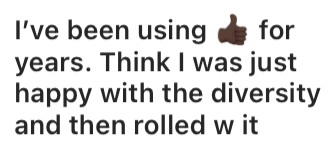
Basically, white people who use Black and brown emojis can often be seen doing it because it’s “funny”.
They use emojis of Black women or nails when they’re trying to be “sassy”, or Black raised hands when they want to say “praise be”. It’s a type of caricature, and Black people are not a costume to be worn when you want to play a type of character.
~ to note that blackface and digital blackface are both forms of minstrelsy (aka turning black people into stereotypes or caricatures, like the angry black woman), which originated in the 1840s. AND: Digital blackface is ALSO cultural appropriation. Using African American ~
— Leona Neelam Maple 💛🍁 (she/her) (@TheLeonaMaple) February 24, 2022
Even if the intentions behind emoji use aren’t as sinister, it’s important to consider that when white people use Black and brown emojis for a specific ~cool~ vibe, they commodify Blackness into a product, or even an aesthetic you can opt in and out of. Meanwhile, Black and brown people themselves have to endure all the experiences associated with their race — not just the positive and fun ones.
So, what’s the takeaway?
Honestly, the broader issue here is that we can’t condense peoples’ entire racial experiences and looks into five somewhat-ambiguous emoji skin tones.
i am darker than 👊🏼🤟🏼👌🏼☝🏼👋🏼
but i am lighter than 👊🏽🤟🏽👌🏽☝🏽👋🏽
so i rarely use hand-shaped emojis bc the lighter one feels like whitewashing/erasure & the darker one feels like digital blackface
welcome to my weirdly specific half-asian emoji-focused ted talk
— chris wei (he/him) (@therealchriswei) July 17, 2018
BUT, we can be sensitive to other people’s feelings, and if you’re a white person who still wants to use brown emojis, just consider this: what’s more important to you? Having “emoji representation” when you are the most represented race in the western world, or respecting your Black and brown friends’ feelings and experiences?
Being respectful is a choice you can make, and hopefully it’s an easy one if the only sacrifice is an emoji.



